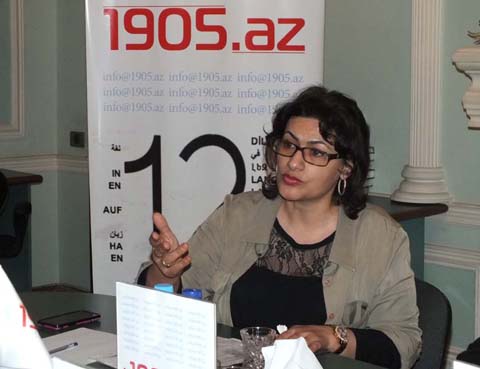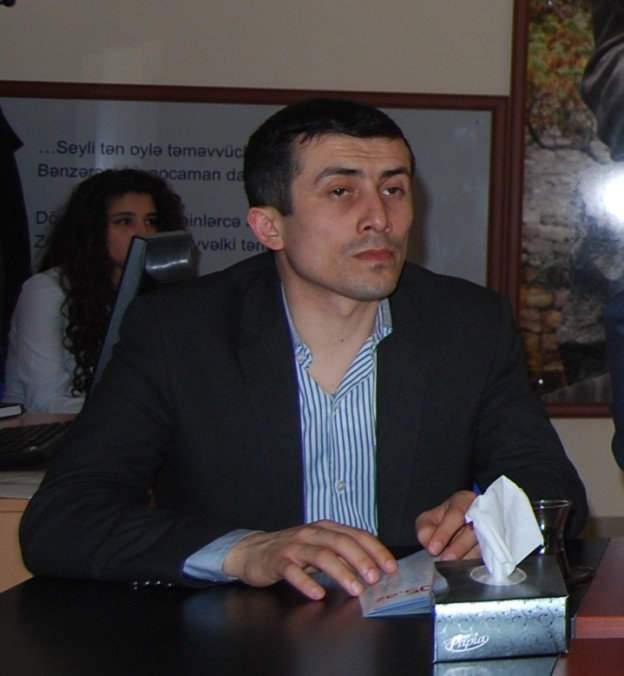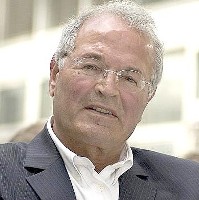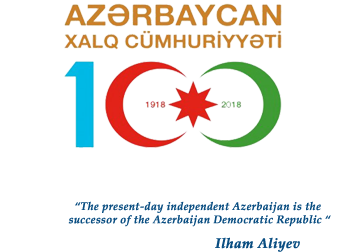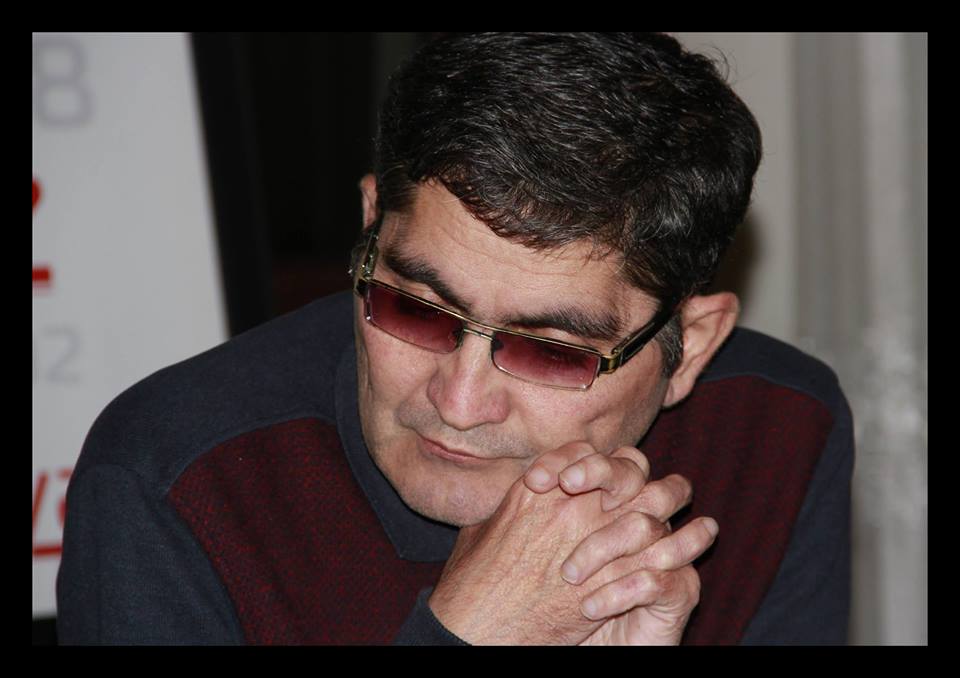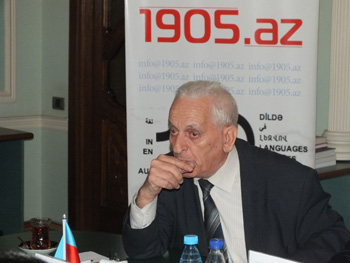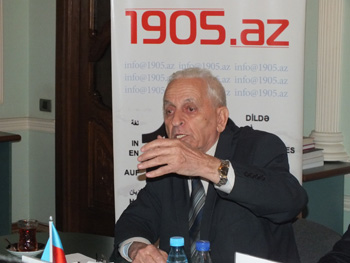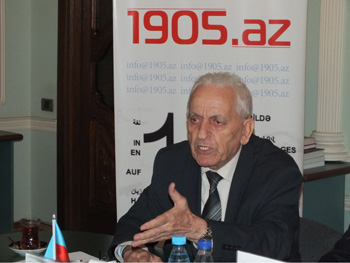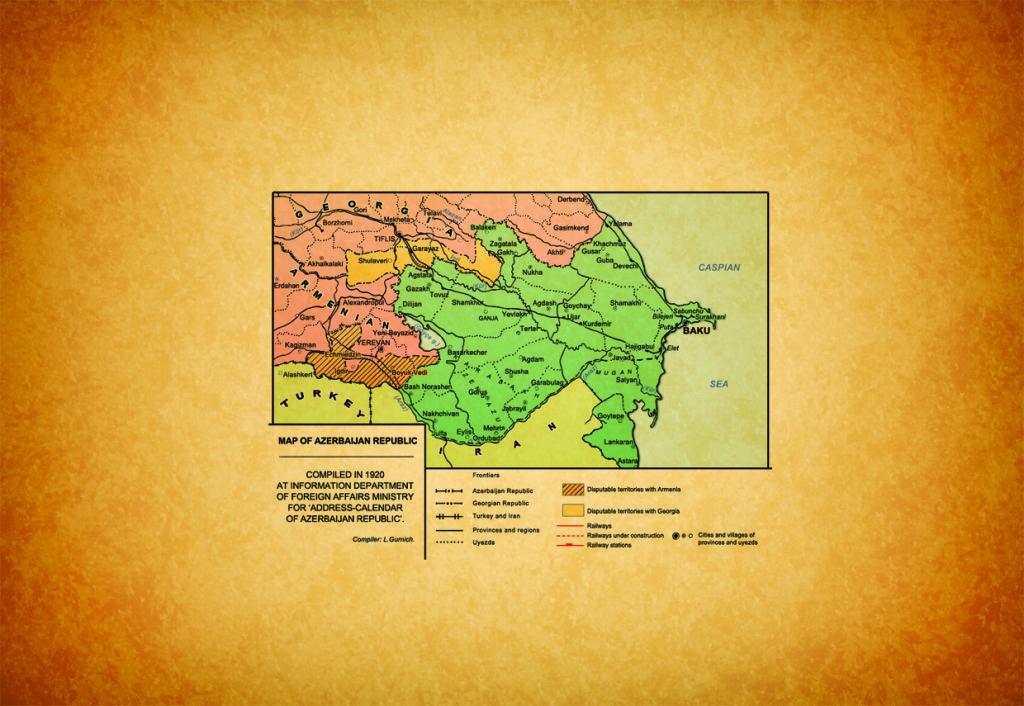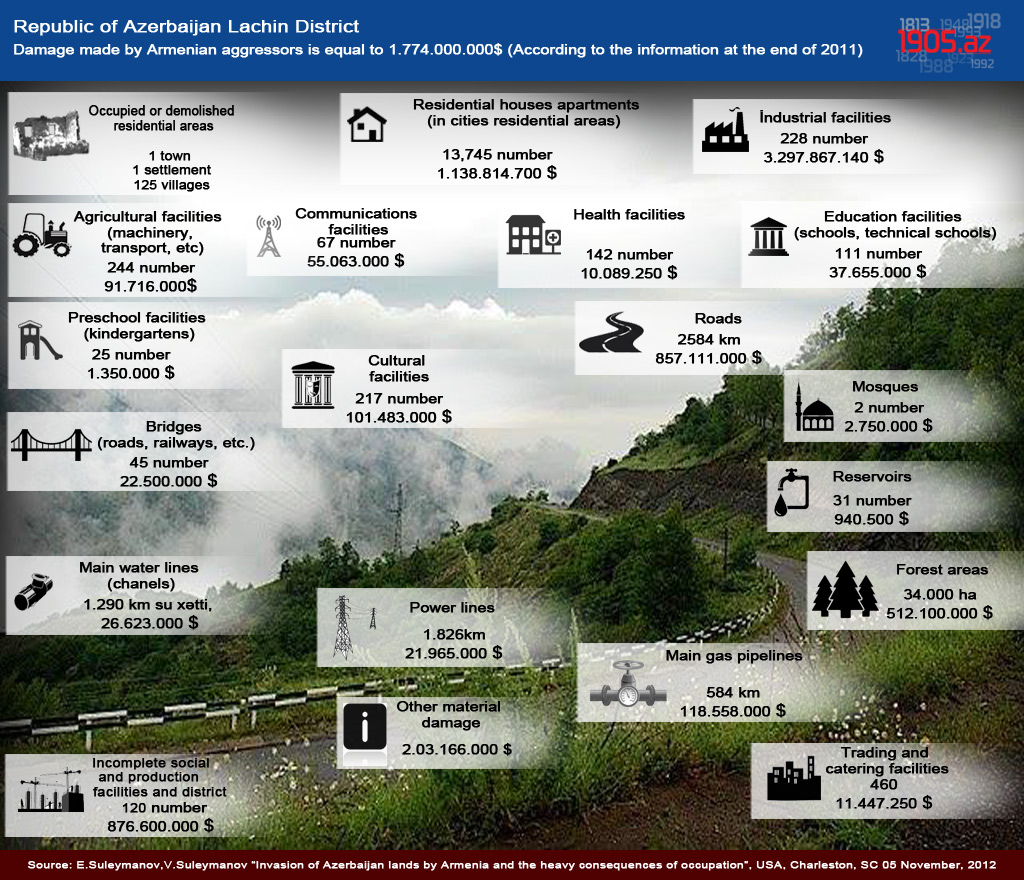Highly esteemed State Secretary of the United States Mr. Powell!
Esteemed co-chairpersons of the Minsk Group!
Esteemed participants of the meeting!
Esteemed representatives of mass media!
Ladies and gentlemen!
Mr. State Secretary, first of all, I want to express my gratitude for your invitation to pay a visit to the United States. I thank the government of the United States, authorities of Key West and the organizers of this meeting for hospitality and created convenient conditions for our work here.
This meeting has its feature, since it is the first time that the Minsk Group of the OSCE has assembled in such a format, the co-chairpersons of the Minsk Group of the OSCE, presidents of Azerbaijan and Armenia and other participants of the meeting are discussing together the ways of peaceful solution of the Armenian – Azerbaijani, the Mountainous Garabagh (Nagorno-Karabakh) conflict.
Unfortunately, meetings in such a format were not held in the past. Perhaps it is one of reasons why we have not gained success in this issue up to now. I hope this meeting will play a positive role in the solution of the 12 year long conflict.
The history of the Azerbaijan-Armenian, the Mountainous Garabagh (Nagorno-Karabakh) conflict is sufficiently known to the world community. I would say without an exaggeration that this is one of the longest conflicts in the world, which has remained unsolved for such a long period.
Therefore, taking the opportunity, I want to mention briefly the reasons, which created obstacle the solution of the conflict and disclose some of my considerations.
It is known that the conflict has emerged in connection with the territorial claims of Armenia, that tried to annex the Mountainous Garabagh (Nagorno-Karabakh) province of Azerbaijan. The Mountainous Garabag (Nagorno-Karabakh) is originally an Azerbaijan territory. In 1988, when the conflict started, Azerbaijan and Armenia, like other republics of the Soviet Union, were parts of the USSR. However the unjust position of the former leadership of the Soviet Union towards Azerbaijan, apparently the unwillingness to prevent the conflict, developed it to a war.
I want to note that the Azerbaijani government granted the Mountainous Garabag (Nagorno-Karabakh) the status of an autonomous province in 1923, and the province fully enjoyed the right of autonomy since then. This is why there was not any objective reason for the birth of the conflict. When the conflict started, the population of the Mountainous Garabagh (Nagorno-Karabakh) numbered 185 000. 74 per cent of them were Armenians and 25,2 per cent were the Azerbaijanis.
Trying to implement its territorial claims against Azerbaijan, Armenia first of all encouraged the separatist, terrorist forces to armed confrontation and then itself began a military aggression against Azerbaijan. The Mountainous Garabagh (Nagorno-Karabakh) fell under the complete control of separatists and armed forces of Armenia. They drove all the Azerbaijanis out, about 50 000 persons in number, they implemented ethnic cleansing into life. All this was followed by the slaughter of population and violence. The inhabitants of the town of Khojali, the Azerbaijanis, were subjected to genocide.
The armed forces of Armenia occupied the Mountainous Garabagh (Nagorno-Karabakh), then overstepping the boundaries of the Mountainous Garabagh (Nagorno-Karabakh), captured seven more administrative districts of Azerbaijan.
Thus, by 1993, 20 per cent of the Azerbaijan territory was occupied and at present the said territories still remain under the occupation of the armed forces of Armenia. Everything has been destroyed and plundered in the occupied territories. Over 900 small and big villages and settlements, about 600 school buildings, 259 medical institutions, all the museums, historical and cultural monuments have been ruined.
30 000 Azerbaijani citizens have been killed in the course of the conflict, over 200 000 people have been wounded and disabled, thousands of people have been taken captives, hostages, or are considered to be missing. About a million people have been deprived of their homes and living in tent-camps under very hard and intolerable conditions for already nine years. Quite a new generation was born and grown in these tent-camps.
There is not a second case in the world that one state occupies the territory of another state and implements mass ethnic cleansing. Unfortunately, the world community watches this tragedy in silence, and the just demands of Azerbaijan to harness the aggressor are not supported. Nine years ago, on March 24, 1992, the Council of Ministers of the OSCE in its extraordinary session in Helsinki, adopted a resolution for convening the Minsk conference in order to reach a comprehensive regulation of the Armenian – Azerbaijan, the Mountainous Garabagh (Nagorno-Karabakh) conflict. Thus, an international institution was founded for the regulation of the conflict. This resolution determining the mandate and structure of the process of negotiations is of great importance.
The Security Council of the United Nations had several times discussed the issue of occupation of the Azerbaijani territories by the armed forces of Armenia in 1993. It has adopted four resolutions – Resolution 822 of April 30, Resolution 853 of July 29, Resolution 874 of October 14 and Resolution 884 of November 11.
These resolutions of the Security Council of the United Nations demand the unconditional and the immediate withdrawal of the armed forces of Armenia from the occupied Azerbaijani territories, return of refugees and displaced persons to their homes. The United Nations supported unequivocally the sovereignty and territorial integrity of Azerbaijan and confirmed that the Mountainous Garabagh (Nagorno-Karabakh) is an integral part of Azerbaijan. The Security Council also supported the mediator activities of the Minsk Group of the OSCE.
But none of these resolutions has been fulfilled and the Security Council of the United Nations has not cared for the implementation of its resolutions.
In the December of 1994, the Budapest Summit of CSCE adopted a resolution for intensifying the activities of CSCE in connection with the Armenian – Azerbaijan, the Mountainous Garabagh (Nagorno-Karabakh) conflict. The heads of CSCE – member countries determined to regulate the conflict in stages and charged the co-chairmen of the Minsk Group to develop an agreement for the cessation of the armed conflict. The intended agreement had to reflect the removal of basic consequences of the conflict for both parties and serve the basis for convening the Minsk Conference. A resolution was adopted for location of multinational armed forces of CSCE in the zone of the conflict in order to secure peace.
In December of 1996 the Lisbon Summit of the OSCE defined the basic formula for the regulation of the conflict. All the OSCE – member countries, except Armenia, supported the following three major principles for the regulation of the conflict. These principles provided the territorial integrity of the Republic of Azerbaijan, security of all the population of the Mountainous Garabagh (Nagorno-Karabakh) and the highest self-administration status of the Mountainous Garabagh (Nagorno-Karabakh) within Azerbaijan.
Thus, the world community determined the legal basis for the regulation of the conflict, the institution of negotiations and the duties of the mediators.
After the Lisbon Summit of the OSCE, three big states – Russia, the USA and France, became the co-chairpersons of the Minsk Group. We cherished great hopes in these countries and supposed that their efforts would regulate the conflict, the territorial integrity of Azerbaijan would be restored and the refugees would return to their homes and lands. But unfortunately, all the said have still remained on paper. Armenia ignores all the resolutions of the United Nations and the OSCE.
The co-chairpersons of the Minsk Group have made three proposals on the solution of the Armenian – Azerbaijani, the Mountainous Garabagh (Nagorno-Karabakh) conflict. The first proposal made by them in the June of 1997, provided the package solution, the second proposal of the October of 1997 provided the solution of the conflict in stages. In November of 1998, the co-chairpersons made a third proposal, that is the proposal of” a common state”.
Azerbaijan accepted the first two proposals as the basis for holding negotiations, some items in them contradicted the norms and principles of the international law, they did not provide the territorial integrity of Azerbaijan completely. Even in this case, Armenia refused to accept the proposals and took obviously a destructive position.
We did not accept “the common state” proposal of the co-chairpersons. This “common state” principle is deprived of any international legal basis, it provides full independence as a state and a territory for the Mountainous Garabagh (Nagorno-Karabakh) it grants the Mountainous Garabagh (Nagorno-Karabakh) a “common state” status, that is, a status which equals the Mountainous Garabag (Nagorno-Karabakh) to Azerbaijan. This proposal is completely against the principles and norms of the international law, deprives Azerbaijan of a part of its territory, in fact, legalizes the occupation of the Azerbaijan territory by Armenia.
We think that guided by the international legal principles, the co-chairpersons of the Minsk Group of the OSCE had to influence effectively on the process of negotiations, make efforts for the immediate regulation of the conflict, for providing the territorial integrity of Azerbaijan and return of the refugees to the places of their permanent residence. The inseparable part of Azerbaijan the Mountainous Garabagh (Nagorno-Karabakh) may be granted a highest self-administration status within Azerbaijan.
Unfortunately, the co-chairmen being chiefly engaged in mediator activities, have not influenced the negotiation processes in conformity with the norms of international law. The hope, which we cherished in the co-chairpersons of the OSCE in the person of Russia, USA and France, has not yet justified the expected results.
Since the April of 1999, on the initiative of the USA government, the presidents of Armenia and Azerbaijan have begun tête-à-tête meetings in Washington. During the past period we have had numerous meetings with President Robert Kocharyan in Geneva, Moscow, Istanbul, Paris, Minsk, Davos, Yalta, as well as in the Armenian – Azerbaijani border. In the dialogues with the Armenian president, we have been particularly in search of mutually acceptable compromises for the immediate and peaceful regulation of the conflict and establishment of a lasting peace between Armenia and Azerbaijan. I want to note that we, were very close to achieving a compromise by the end of 1999. But soon Armenia retreated from the obtained agreement.
In the course of difficult negotiations, Armenian party has always taken a severe and destructive position, and even today it is occupying the same position. As Armenia has occupied 20 per cent of the territory of Azerbaijan and tries to use this fact as its superiority in the negotiations, we can not reach an agreement with Armenia. By all means Armenia tries to tear a part of the Azerbaijan territory and annex it, or to get the status of independence for the Mountainous Garabagh (Nagorno-Karabakh).
Unfortunately, being confident by our negotiations, the co-chairmen of the Minsk Group have been occupying a wait-and-see position and restricting their activities with the principle “Any agreement reached by the presidents will be satisfactory for the OSCE.”
We think that the meetings of the presidents do not substitute the activities of the co-chairmen of the Minsk Group. On the contrary, these two things must mutually complete each other and provide the progress in negotiations for the solution of the conflict.
According to the principles and norms of the international law and the Charter of the United Nations, the territorial integrity and inviolability of the borders of the UN-member countries are to be observed by all the states and particularly the OSCE which has taken the responsibility to solve the conflict. The OSCE and its Minsk Group must strictly observe these principles and render every assistance for the implementation of these principles.
The situation, which has emerged in the process of negotiations today, is giving birth to a dangerous precedent in international relations. Instead of making everybody observe the norms and principles of international law strictly and strengthen them, the world community demonstrates indecision. Such basic principles and norms of the international law as the inviolability of borders and territorial integrity are doubted. Because of 100 000 Armenians, who live in the Mountainous Garabag province of the Republic of Azerbaijan, the norms of the international law and the international experience in this sphere, which have stabilized in the course of many years, are destroyed. Peace, stability and security gained as a result of recognition of military aggression can not be lasting and durable.
By commenting on the history of the situation, which has emerged in the Armenian- Azerbaijani, the Mountainous Garabagh (Nagorno-Karabakh) conflict, I declare unequivocally that Azerbaijan is devoted to peace, to maintenance of the cease-fire regime achieved in the May of 1994. We shall henceforth make full efforts for the peaceful regulation of conflict.
Along with the said, I suppose all I’ve told you here enable you to imagine the degree of graveness of our situation. Therefore, I appeal the co-chairmen of the Minsk Group of the OSCE, Russia, the USA and France, to make more active their efforts for the solution of the armed conflict, for reaching a lasting and durable peace.
There is no need to prove that Azerbaijan is interested more than any other party in the solution of the conflict, in gaining peace, while 20 percent of its territory is under occupation and over a million of its citizens live in tent-camps. It is clear that the signature a peace treaty between Armenia and Azerbaijan will have exceptional importance for stability and security in the whole Southern Caucasian region.
We have come to this meeting with great hopes and we expect that the co-chairmen of the Minsk group, Russia, the USA and France, will multiply their efforts, and as well as Armenia will occupy a constructive position.
Thank you for attention.
The document was taken from the edition “Roads leading to peace”.

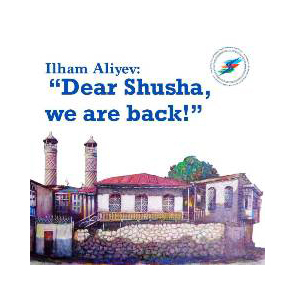

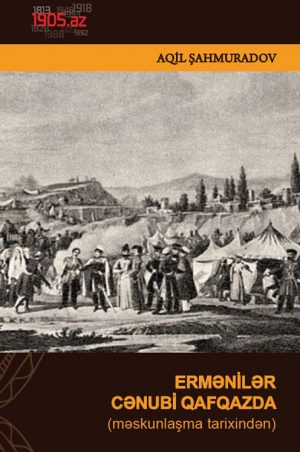





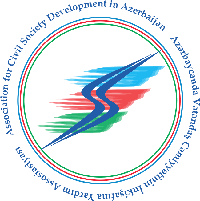
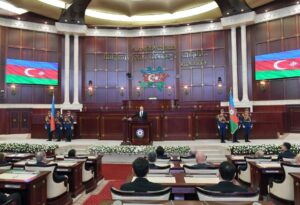 Inauguration ceremony of President of Azerbaijan Ilham Aliyev was held
Inauguration ceremony of President of Azerbaijan Ilham Aliyev was held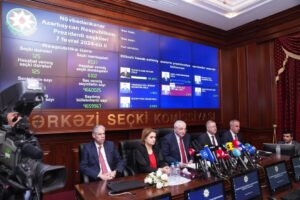 Ilham Aliyev wins presidential election with 92.05 percent of votes VIDEO
Ilham Aliyev wins presidential election with 92.05 percent of votes VIDEO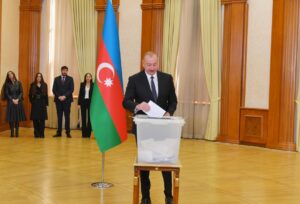 President Ilham Aliyev, First Lady Mehriban Aliyeva and family members voted in Khankendi VIDEO
President Ilham Aliyev, First Lady Mehriban Aliyeva and family members voted in Khankendi VIDEO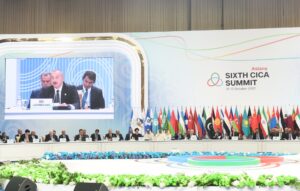 Plenary session of 6th Summit of Conference on Interaction and Confidence Building Measures in Asia gets underway in Astana. President Ilham Aliyev attends the plenary session VIDEO
Plenary session of 6th Summit of Conference on Interaction and Confidence Building Measures in Asia gets underway in Astana. President Ilham Aliyev attends the plenary session VIDEO President Ilham Aliyev was interviewed by Azerbaijani TV channels in Prague VIDEO
President Ilham Aliyev was interviewed by Azerbaijani TV channels in Prague VIDEO



